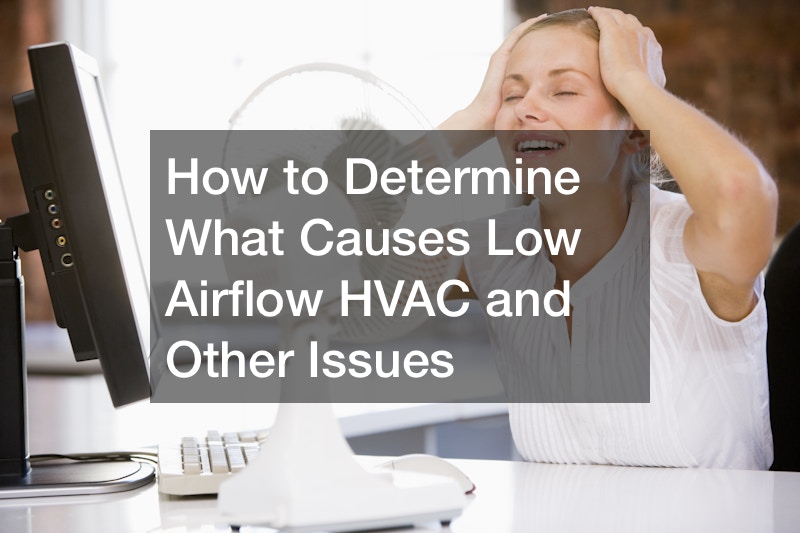You need to have a basic understanding of how your HVAC system works to avoid any potential problems. For example, one of the more common problems you may find is low airflow. This is usually a sign of a larger problem making it critical to understand what causes low airflow HVAC. This guide can help you begin to think about the causes and issues caused by low airflow HVAC.
Talk to Professionals About Your Specific Unit

Even when you know a little bit of basic information about your HVAC unit, you should consider contacting a professional to determine what causes low airflow HVAC. When you contact a professional about your specific HVAC unit, you can feel confident they have the experience, knowledge, and tools needed for your specific unit. While most HVAC units function the same general way, each manufacturer is a little different. For example, if you have a Rheem HVAC system, you should contact a company that services Rheem products. If you still aren’t convinced that you should consult specific heat and AC contractors, consider these additional reasons. When you want to know what causes low airflow HVAC, having someone with the right expertise could make all the difference. When HVAC professionals have a thorough understanding of how the system works, they can quickly identify and fix problems with the specific unit. In addition, they are able to advise you on what’s the best course of action with repairs and upgrades.
HVAC systems can be complex machines and may have dangerous components, including gas lines, refrigerant, and electrical wiring. Professional technicians are trained to handle these components safely. When your HVAC system is working properly, it ensures that your home remains comfortable while also saving energy. You may need the assistance of a professional to identify and fix the cause of the low airflow. Another key consideration for hiring a professional is most units come with warranties. If you attempt to fix your unit on your own or it’s not properly repaired and maintained, your warranty may be voided. Technicians can educate you on the terms of your warranty so you aren’t caught unaware.
Discuss Potential AC Alternatives
When you start to learn about your unit and what causes low airflow HVAC, you may begin to consider alternatives to your current unit. You may be surprised to find out there are different types of systems available to you. You may also find that alternative options, like evaporative coolers or geothermal systems, may be more cost-effective when compared to traditional air conditioning systems. In addition to saving money for installation and using the systems, they tend to be more energy-efficient. This means they are helpful in reducing your energy costs. In addition, you may want to find a system that has less of an environmental impact than your traditional air conditioning system. A geothermal system uses the natural heat-exchange process of Earth to cool your home. It does not rely on refrigerants which deplete the ozone. When you upgrade your AC system, you may be able to switch to one that is customizable and provides targeted cooling to specific areas of your home and not the entire space. This can be more cost-effective.
Another alternative option to consider is a mini split HVAC system. This type of air conditioning and heating system consists of an outdoor unit and indoor units that are connected by a small conduit. When you have this type of unit, it is best to have a regular mini split hvac inspection. Mini-split systems require regular maintenance for efficient and effective operation. An inspection identifies any potential issues. Regular inspections and maintenance ensure that your mini-split system runs as efficiently as possible. This can help save you money over the long term on energy costs. It is essential to know that a mini split HVAC system involves electrical connections and complex components. When having regular inspections help ensure that your system is safe to use.
Understand How Large-Scale HVAC Works

When you are wondering what causes low airflow HVAC, you should be aware that large HVAC systems function differently than residential systems. If you have a business, retail store, large building, or warehouse, you may need commercial HVAC services. When you understand how a large-scale system works, you are better prepared for what may happen with your system. Commercial HVAC services are intended to ensure your building’s HVAC system operates properly and efficiently. This allows you to make sure that everyone in your building remains safe and comfortable. There are some general services you can expect from a technician when working on a large-scale system. Commercial HVAC contractors install new HVAC systems in new construction but can also retrofit existing buildings with new HVAC systems. In addition, they can diagnose and repair any issues that may occur with the system. Finally, contractors perform regular maintenance, which includes cleaning and inspecting the system for efficient and effective operation.
Large-scale HVAC systems often use significant amounts of energy. When you understand how they work, you can find areas where you can improve energy efficiency and reduce energy costs. Part of the way you can do that is to follow a regular maintenance schedule. Just like the HVAC system in your home, large-scale systems are complex and have components like gas lines and electrical wiring. These systems can be dangerous, especially when not handled properly. When you understand how these systems work, you can identify potential safety hazards. When you are able to troubleshoot your system, it gives you an advantage when identifying small concerns before they become larger and more expensive problems.
Apply That Knowledge to Your Home’s Energy Efficiency
When you know what causes low airflow HVAC, most likely, those issues impact the efficiency of your system. When you have low airflow, it is most likely being restricted and causing your system to work harder to maintain the temperature in your home. In addition, this causes your system to use more energy and cost more money in energy bills. A residential HVAC contractor will tell you there are several reasons why you may have low airflow. Components such as closed or blocked vents, duct issues, dirty air filters, fan problems, and refrigerant issues can cause decreased airflow. A professional can inspect your HVAC system and diagnose any issues to recommend the proper steps that should be taken. When airflow is restricted, the system is not able to cool or heat properly and maintain the desired temperature. When this happens, there may be drafts and uneven temperature distribution. This can cause it to be uncomfortable for those in the space.
When your HVAC unit struggles to maintain temperature, it may run longer or more frequently to compensate. Anytime an HVAC system works harder to maintain the desired temperature because of low airflow, it causes increased wear and tear on the system. You may find that you have more frequent repairs and possibly reduce the lifespan of the system. This could mean you have to replace your HVAC system sooner, which is more money out of your pocket. You may find that your HVAC system has a much shorter lifespan than it should as a result.
Consider Whether Repairs or a Replacement Is More Costly

Once you know what causes low airflow HVAC for your system, you may be faced with an expensive decision. You may have to decide if you repair the system or pay for an HVAC replacement. Therefore, it is essential that you determine the exact cause of the low airflow and consider the age and condition of your system when deciding the next best step. In some cases, the smarter and more affordable option is to repair your system. However, in other cases, it makes the most sense to replace it. When faced with this important decision, there are some key factors to keep in mind.
The age of your HVAC system matters. If it is old and has frequent repairs, it may be more cost-effective to replace it with a newer model that is more efficient. The complexity of the problem can make a difference, too. If you are facing a minor problem with your HVAC system, it may be an easy and inexpensive fix. In that case, you should fix the system instead of replacing it. The more severe the problem is with your unit may push you closer to replacing it instead of repairing it. Outdated and antiquated systems are not as efficient as newer models. With the money you save on energy bills, it may be more cost-effective to buy a newer unit. You should get a professional assessment of the problem and an estimate of the cost of fixing it. This can be the ultimate determining factor when you are deciding if it’s time to replace or repair.
Ask About the Scope of Repairs and If They’d Be Recurring
When you understand what causes low airflow HVAC in your unit and decide what to do about it, you should ask some questions. First, you want to get a qualified HVAC repair company to assess your unit. You want them to provide you with a full report of the extent of the repairs. This gives you a better understanding of the work that must be completed, the parts needed, and, most importantly, the cost. Asking if there is an expectation that the repair or maintenance needs to happen on a recurring basis allows you to budget properly. When you are facing AC repair services, you want an accurate estimate of the cost of the repairs.
The best way to get this is to have a detailed scope of the work needed. This helps give you a more accurate estimate of the cost of the repairs. When you get estimates from more than one company, you can make a side-by-side comparison of the estimates. This can help you make an informed decision about which to choose. You want to understand the full scope of the work to guarantee your HVAC unit is in good working order. This helps you prevent future problems and ensure that your unit is running efficiently. You also want to know how much of the work is covered under warranty. This can help you avoid unexpected repair costs in the future.
Refer Your Company to Friends and Neighbors

When you are happy with the work that HVAC contractors have done for you, you may want to recommend them to your family and friends. It can be challenging to find reputable and quality companies. When you recommend someone you know and trust, you can feel secure that your loved ones are taken care of. When you find an HVAC company that you trust and believe to be honest and reliable, you want to share those positive experiences with people you know. This can help the people you care about feel confident in choosing this person to work on their HVAC system. When you know what causes low airflow HVAC, you may want to share your knowledge with others. You can help them find professionals that remain courteous and reliable throughout the entire job and beyond.
When you find a contractor that provides you with competitive pricing, you want to hold on to the person and share their information. Not only do you want to give your contractor additional business to help them stay in business, but you also pass along their information to those looking for an affordable HVAC contractor. Unfortunately, it isn’t always easy to find someone that is skilled at communication. When you find someone who keeps you informed and answers your questions throughout the entire process, you should recommend them to your family and friends.
It may not always be easy to determine what causes low airflow HVAC, but once you do, it enables you to make more informed decisions. As a result, you can provide better basic maintenance and make decisions about repairing or replacing your unit.



